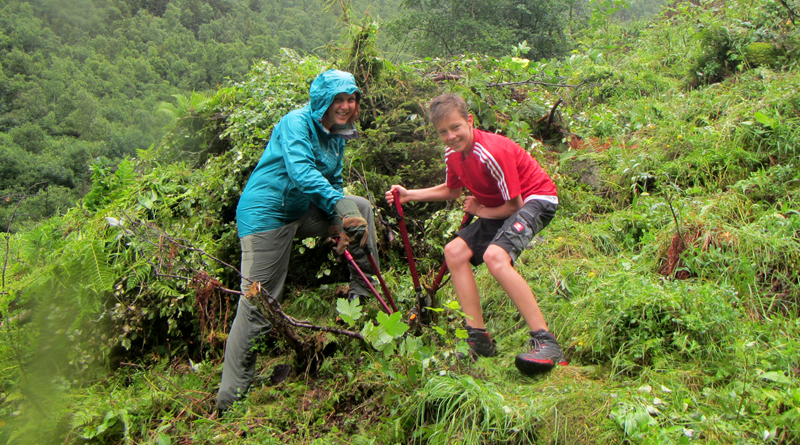HOLIDAY IN AUSTRIA’S ZILLERTAL AS A VOLUNTEER
Clearing bracken, or chopping back trees may not be your idea of a holiday – but before you dismiss it, let me tell you why, having spent my break doing just that as a volunteer, I’d recommend it.
Zillertal is a region within Tirol, Austria. It’s around 40km from Innsbruck and contains the High Alps Nature Park Zillertaler Alps – a protected area of around 400 square km. The altitude ranges from 1,000m at Ginzling to 3,509m at Hochfeiler. It’s an area of natural landscapes with 80 glaciers, rich biodiversity and unique crystal deposits.
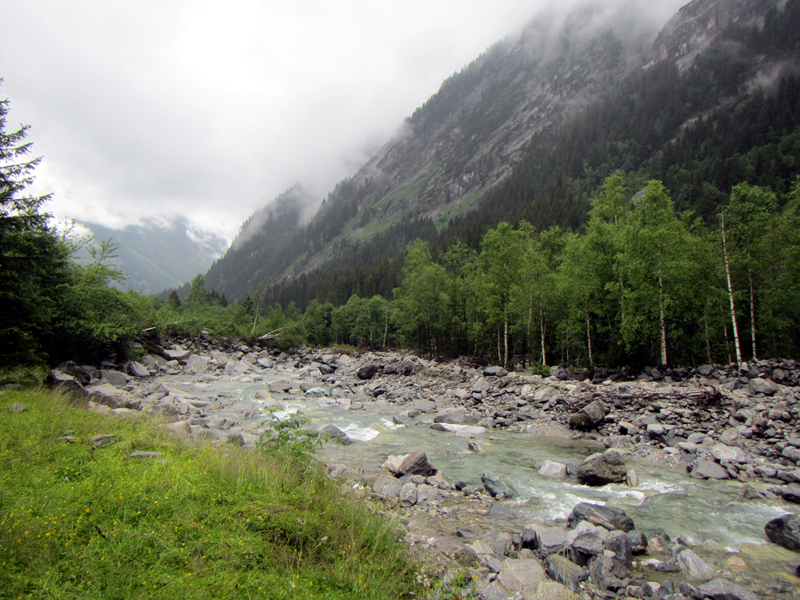
For centuries it has been farmed, mainly with dairy cows and goats. The steep valley sides producing rich grass for the cattle – but a tough environment for the farmers. In the past these high Alp farms were maintained by large families, working on the land, keeping it clear, mowing the meadows for hay, bringing the cattle down the mountain in winter and leading them back up for the short summer season. But as families have become smaller, and moved away lured by life in the big cities, the farms have become difficult to maintain.
Which brings us to a volunteering holiday in Zillertal.
I spent two days volunteering in the high Alps: One day clearing bracken on Schwemmalm Farm, around 1350m above sea level in the Zemmgrund valley, which contains the largest alluvial forest with gray alder in the Zillertal Valley; and the second days cutting trees at Lengauhof Farm in Ginzling.
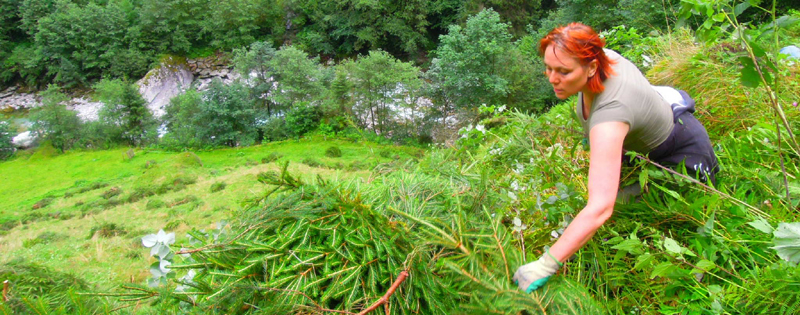
The first day we drove into the park and met Theresia Penz who owns Schwemmalm Farm, from there we hiked about 20 minutes further into the park along the course of a river, picking (and eating) tiny wild strawberries as we went. We arrived at one of the pastures, where the pale brown cows, with their long lashes and tinkling bells, watched us as we headed for the slopes ready to cut back the bracken that prevents the herd from feeding in that area.
Removing bracken actually isn’t as tough as it sounds – and one of the many benefits is the occasional discovery of the small, jet black salamanders hidden in the undergrowth. We worked through the morning accompanied by the musical chimes of the cow bells and the roar of the river chasing its way over boulders to reach the valley floor. Somehow hard work seems far less taxing when the air is sweet and the silence is broken only by nature.
After a morning of chopping and we headed back for lunch – in my case a plate of my favourite … Kaiserschmarrn with apple sauce.
The second day we were working closer to the town with Thomas and Brigitte Kern and their two daughters Nathalie & Magdalena – owners of the organic Lengauhof Farm. We were tasked with clearing a very steep slope of the tiny spruce trees that were beginning to populate the area. By removing the trees, we would open up the land for grazing. Farming is strictly controlled here with the emphasis on low intensity. Cattle numbers are regulated depending on how much grazing area you have – unlike the UK where we generally cram as many cows into a field as we can get away with.
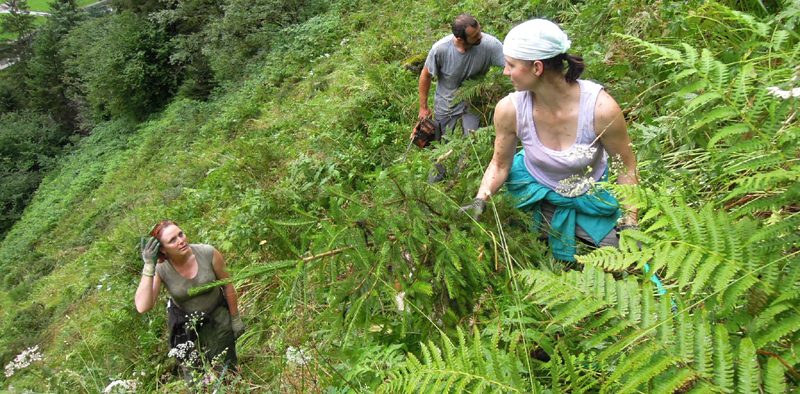
The hill we were working on was so steep that as I stood upright, the land in front of me was less than a foot from my chest. Fortunately, goats and cows had been there before – creating small indents where you could put your feet and climb the slope, almost as though you were using a tiny, winding staircase. We chopped away at the trees and pushed them away hoping that they’d roll down the hill. Well, I can tell you that spruce trees don’t seem to roll! Soon the slope was littered with the fruits of our labour. To get the trees down, we sat on our bottoms, legs out in front of us, and slid down the grass pushing great walls of tree branches in front of us. Pluto, the farm dog, loved this and attempted to help by grabbing any sticks he could find.
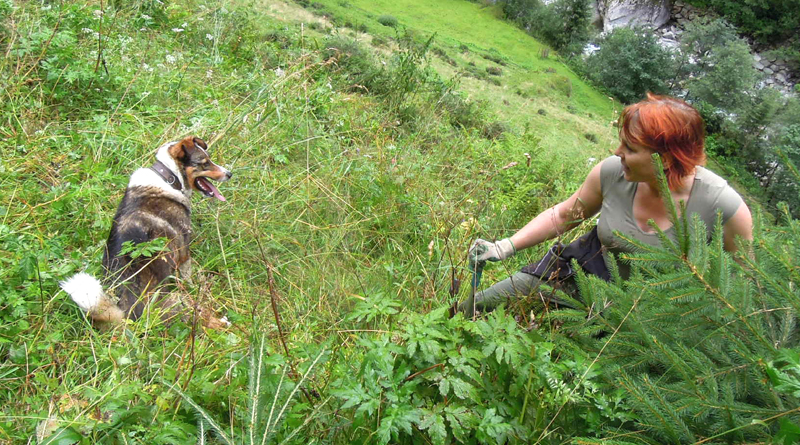
At the end of the day we headed back to the farm house and drank coffee, whitened with lashings of the farm’s fresh organic milk, and munched our way through plates of the various cheeses they produce (my favourite was the hard goats cheese). Brigitte, clearly very grateful for the help, took me to meet some of her young cows, who nuzzled me with their wet noses and licked my hand with their rough pink tongues. In return I scratched their foreheads and behind their ears – and they seemed happy with the trade.
Then it was off to meet the pigs. They too seemed pleased to see us, sniffing at me and then shuffling over for a scratch. As a vegetarian I had to ask ‘Do you eat the pigs?’
‘We eat very little meat normally as I do not agree with intensive farming and the animal cruelty it involves. We will only eat our own animals – as we know they have been cared for properly, have been fed food that is appropriate for them and free of chemicals. All our animals are part of our family and we love them – so it’s important for us to care for them properly.’ explained Brigitte.
 I headed back to the Alpenhotel Kramerwirt in Mayrhofen and eased my muscles in the hot tub, feeling satisfied with the day’s achievements.
I headed back to the Alpenhotel Kramerwirt in Mayrhofen and eased my muscles in the hot tub, feeling satisfied with the day’s achievements.
You may wonder why you’d volunteer to work on a privately owned farm – what benefits is that delivering other profit into the farmer’s pocket? The reason is simple; it helps protects the local habitat and the plants and animals that call it home. If these farms failed, or the land was neglected, the alpine flora, some of it very rare and found only in these valleys, would disappear. As would many of the insects and other creatures. And we’d lose the iconic mountain meadows and landscape of the Tirolean valleys.
We have similar issues in the UK. For example, the North Surrey Downs near where I live, is also a manmade landscape; like Zillertal it has been created by centuries of grazing cattle. If we stopped managing the Downs, and allowed the trees to encroach we’d lose this chalk grassland habitat and the rare flowers and butterflies that live there. And Surrey would be visually very different.
So by volunteering, you’re helping these farms to protect the landscape and its inhabitants. It also helps to encourage the continuation of low intensity and organic farming. Austria already has the highest percentage of organic farming within EU – let’s help them maintain that. And perhaps we should be thinking about a similar approach in the UK where almost all our grassland is intensively managed (damaging the environment and often polluting our waterways).
So if the warm glow you get from giving something back, from help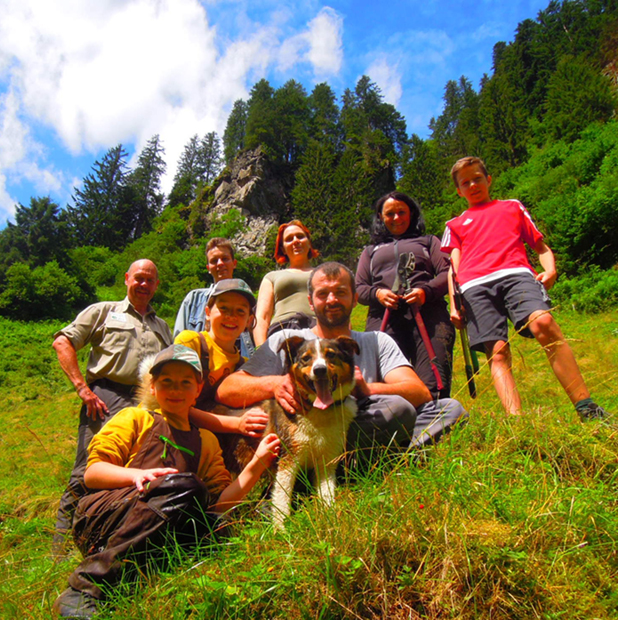 ing to protect the environment and conserve the wildlife isn’t enough to convince you that a few days volunteering is a good idea, then let me add something else…
ing to protect the environment and conserve the wildlife isn’t enough to convince you that a few days volunteering is a good idea, then let me add something else…
Volunteering in the Zillertal Nature Park is also a great way to meet local people. Not just the perfunctory conversations with the receptionist at the hotel and the waiter in the restaurant, but people who work away from tourism. You’ll be invited into their home and you’ll have the opportunity to talk to them about their lives and their views.
If you really want to experience a place – get to know its land, and get to know its people. And what better way to do that than by giving a few days of your time to volunteer in one of the most beautiful valleys in Europe.
FACT BOX
Nature Park Facebook Page
Alpenhotel Kramerwirt, Mayrhofen
Tirol Tourism: Volunteering in an Alpine pasture
ABOUT THE AUTHOR
Chantal Cooke is an award winning journalist, broadcaster and travel writer, and co-founder of PASSION for the PLANET radio, and Panpathic Communications. Follow her on Twitter @ChantalCooke

